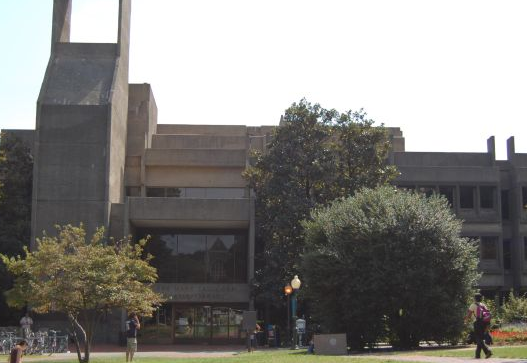Student workers at Lauinger and Blommer Library are protesting changes in policy regarding payment for student library employees that resulted from the rise in the Washington, D.C. minimum wage.
The minimum wage increased to $10.50 per hour on July 1, 2015. While student employees at the library who had earned below this threshold saw their wages increase to the new minimum, those earning this wage or above found their wages frozen, as the libraries eliminated their former policy of increasing wages 25 cents per semester.
The loss of the semester wage increase has become a point of concern for student workers. “In our student worker handbook, it says you will get a 25 cent increase if you demonstrate good work, so we are a little concerned,” said Maxwell Menard (SFS ‘16), a supervisory student worker at the library.
According to Chloe Lazarus (COL ’16), also a supervisory student worker at the library, the opportunity for promotions and regular wage increases were important benefits of a library position. “I started my fall sophomore year, and this is my senior year, [and since starting] I have made some improvements in my salary, which is great since I rely on this money for food, textbooks, and everything,” she said, “and so [the opportunity for wage increases] was the main appeal of the job, as well as the fact that we could have really flexible hours.”
The library noted the dual effects of the minimum wage increase.
“The [minimum wage] increase has benefitted students who began work in 2013 (at $8.25) or 2014 (at $9.50) and who are continuing in the same jobs (at $10.50 to $11.00 since July 2015),” Peggy Fry, deputy university librarian, wrote in an email to the Voice. “However, an unintended consequence is compression in the hourly rates of returning Access Services student workers and new hires ($10.50/hr.). This compression has not been as pronounced in some other library departments, which structure student positions by skill level.”
Additionally, students expressed concern that their wages were not being readjusted to scale with the new minimum wage. The Student Employment Office (SEO) sent a memo to university departments in advance of the implementation of the new minimum wage that recommended that departments readjust the wages for student employees. It outlines four categories for workers – including novice, semi-skilled, skilled, and highly skilled – as well as appropriate wage ranges for each classification. Departments were encouraged to adjust wages so that workers in each of these categories received compensation that continued to reflect their skill level.
The recommendation from the SEO to adjust wages based on skill is not mandatory, however. “They’re only really suggested rates,” said Esmeralda Huerta (SFS ’17), co-director of the Office of the Student Worker Advocate (OSWA). “And so while [there may be] workers with a lot of experience, who might have been working there for a long time, or enough that they’re considered skilled, in actuality there’s no real enforcement to make sure they’re getting paid what they deserve.”
When the minimum wage increased last year from $8.25 to $9.50 per hour, the library adjusted wages to the new scale, and applicable wages were raised above the minimum. This policy changed this year with the capping of wages, which Lazarus said restricts employees’ opportunities for growth.
Nearly all student library employees signed an email sent to library administrators which stated their dissatisfaction with the lack of student input in these policy changes. Consequently, student workers and representatives from OSWA met with senior library administrators on Nov. 20 in an effort to address these concerns.
According to Menard, an issue that arose out of the meeting was that the library does not set its own budget. “They have the same budget allotted…throughout this year, next year, and the years past, even though the minimum wage increased,” he said.
Fry wrote in an email, “Working within fixed budgets, the library is endeavoring to maintain its hiring and employment levels insofar as possible, so that students can find library jobs with sufficient hours to expend their work-study awards.”
The library is introducing a new three-tiered system for wages in an effort to compensate for these changes. According to Lazarus, the bottom tier remains as it is currently, where new hires are paid the minimum wage. The second tier also mimics the current system, as students are given a one-time wage increase for being promoted to a supervisory student. Students can apply to the third tier, which is limited to six students, and work as the supervisor when a manager is not present, on night and weekend shifts.
Still, this plan did not address all of the students’ concerns. Lazarus said that many students already complete the work of the new third tier and so the difference between the second and third tiers is minimal. “And not only does the setup of the 1-2-3 tier not make any sense it doesn’t address the fact that we don’t get our 25-cent increases and we don’t get a readjusted scale,” she said.
OSWA has offered support to library workers, who are now launching a school-wide petition effort. They tabled with the Georgetown Solidarity Committee in an effort to promote workers’ rights, including respecting seniority and experience, according to Huerta.
“I think it’s really important that we fight this now,” Huerta said. “I know the library also mentioned that it wasn’t in their budget to keep instituting the [wage] increases every semester, but I think it’s important that we fight to keep these as good jobs.”
The library workers each have their own goals for this petitioning. “I think it’s differing depending on who you ask for library employees,” Menard said.
For Lazarus, goals include increased student engagement in student employee decisions and changes. “But overall, I think that this fight doesn’t only affect the library,” she said. “I think our main goal is for a just employment on this campus.”





